Rogue One Succeeds Where The Force Awakens Fails
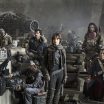
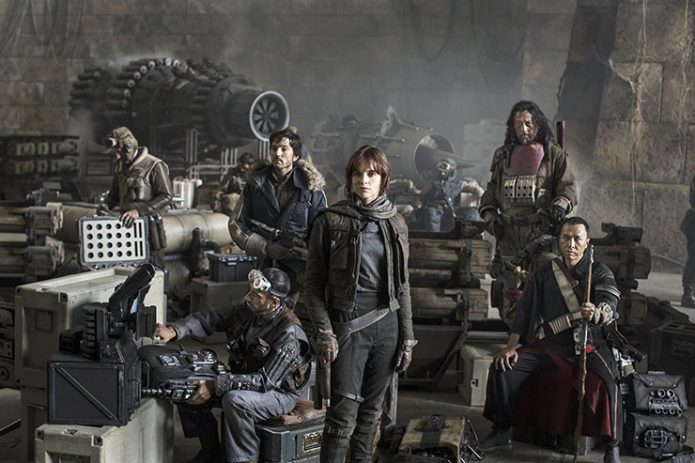
With a title like the one I’ve chosen, needless to say there will be massive spoilers ahead for both The Force Awakens and Rogue One…
It is a sad state of affairs that I have now trained myself to go into a new Star Wars film with no expectations. I’ve written in the past of experiencing The Force Awakens years after the foul taste of the prequels had worn off, hopeful of a fresh start, only to be punched in the guts. I had long since learned of Disney’s plans to have annual Star Wars cinematic releases by interspersing side-films in between the primary output of the “new” trilogy, so when details emerged about Rogue One I was interested, but not particularly invested.
I walked out of the theatre highly impressed with Rogue One. Curiously, it had the effect of making me dislike 2015’s The Force Awakens even more than I already do. I began to realise that this was because I had just seen a movie that managed to succeed at being enjoyable and competent where TFA did not. Taking into consideration how relatively modest the ambitions of Rogue One are as a story and as a Star Wars film compared to TFA this should not be possible.
What do I mean by this? Looking at the full name of this film “Rogue One: A Star Wars Story” and reading about the filmmaker and Disney’s intentions, this was always meant to be a lesser entry in the franchise. These side movies are morsels to tide us over and a way to milk the Star Wars cash cow ever further. Deliberate decisions by the creators mean this is a different sort of animal than a main saga film in the franchise. For starters, there is no opening crawl. Rogue One features an original score with few references to recognizable John Williams compositions. Beyond brief cameos, no beloved characters from the saga make up the cast. Even the Force, so important to the mythos, plays a much reduced role than we are used to.
Given these limitations, for Rogue One to shine compared TFA would not only be unexpected, but unreasonable: it shouldn’t even be a fair fight. And yet, a film that aims to accomplish much less manages to, in my eyes, put TFA to shame, without even trying. JJ Abrams and his crew should be embarrassed to have been outdone by the junior varsity team under Gareth Edwards. So, how does Rogue One manage this feat?
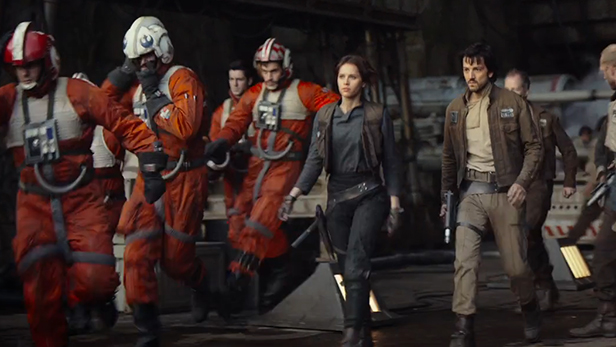
Well to start, I would speculate that the willingness to change course had some effect on the final product. Comparing the theatrical release of Rogue One to the film it seemed to be in the original teaser trailers, one can imagine how poorly it could have gone. Clichéd music, stupid or hackneyed lines of dialogue and a decidedly not subtle attempt to present main character Jyn Erso as an unequalled bad-ass were all front and center in early marketing. A great deal of this garbage ended up being cut or adjusted, and you can see it was for the better. Of course, TFA, which also had its own reshoots is proof that not all films can be rescued through this process.
Rogue One has a fairly large cast, and its run time is not much longer than an average Star Wars film; as a result, there isn’t a huge amount of room available to be spent on characterization. Nevertheless I found myself caring about and understanding the motivations of this rag-tag band of rebels more than any of the thinly-sketched new characters from TFA. As others have pointed out before, very little in TFA is earned, least of all that I should care about Rey, Finn, Poe or Kylo Ren for any reason except that they are on the poster. As the film meant to set up the main players in a new trilogy as people worth rooting for, TFA is a failure. Rogue One’s cast have passed into legend by the end of this movie because you understand who they were and what they fought and died for.
The subject of death is another area that Rogue One handles far better than its theatrical predecessor. The death of Han Solo is meant to be the emotional crescendo of TFA, and a shock for the audience. Anyone aware of Harrison Ford’s animosity towards his beloved character should not have been surprised to see this development. He has also spoken in the past of his opinion that Solo should have died in the original trilogy, sacrificing himself for the greater good. That would have been a much more satisfying scene to watch than the pointless way in which Solo was put down – a capitulation, nothing approaching a noble sacrifice to save his friends. By comparison, the entire crew of Rogue One give their lives in the pursuit of the Death Star plans on a mission that they should not have expected to survive. The loss of each of these Rebels is keenly felt on-screen. The impact of Han Solo’s death shouldn’t be overshadowed by that of a team we’ve had only one film to get to know.
The most rabid TFA fans and apologists are particularly protective of their pet favourite, Rey. Any criticism or commentary that undermines Rey’s position as a strong, female protagonist is attacked or ignored: the stakes are high and very personal. Surprisingly, barely a year after Rey’s appearance, Jyn has come along and completely surpassed her in every way. Thanks to reshoots and rethinking, Jyn is no cold, sarcastic, dead-eyed mercenary, but actually has a personal stake in the issue of both the Death Star and the wider struggle of the Rebellion against the Empire. Raised in a dissident atmosphere by Saw Gererra, her skill-set is exactly what you would expect. Nothing Jyn accomplishes or is capable of in the film seems unsupported by either logic or her background – anyone who would claim the same of Rey is either willfully blind or dishonest. The loss of her father pains her and drives her on – when she loses him a second time her reasons for wanting to see the mission through are completely understandable. I remain as unconvinced of Rey’s motivations as I do of the permanently confused look on Daisy Ridley’s face in TFA. Jyn is a stronger, more rounded, more grounded character, faults and all, than Rey will likely turn out to be after three entire films.
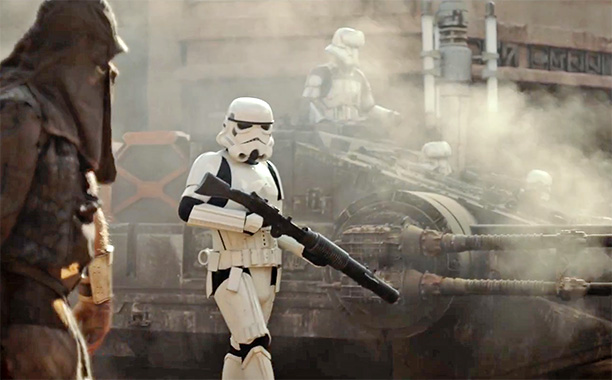 Rogue One, despite missing so many of the central saga elements that I mentioned above, manages simultaneously to feel more connected to the other Star Wars films than TFA as well as adding more to the lore of the universe. Even many of TFA’s fans will admit it suffers from a lack of originality: familiar vehicle types get new paint jobs, super-weapon ideas are recycled, information is secreted away on droids. What little detail TFA has added to the canon (Knights of Ren, rathtars, Church of the Force, the planets Takodana and Jakku) is fleshed out almost entirely in supplementary material as opposed to in the film itself. On the other hand, Rogue One provides a glimpse at the fledgling, unconfident Rebel Alliance prior to Episode 4 and the “first victory” alluded to in the opening crawl. It addresses the issue of the Death Star’s “fatal flaw” in a believable way. Our view of the Empire is expanded, its internal machinations and the politics surrounding the Death Star’s construction is explored. The enormous power of the Death Star is made more personal, tangible, and terrifying – rather than a ball of sparks exploding in space. A new villain is introduced and an two existing ones are given a chance to grace the screen at the height of their powers. Rogue One, even with its copious nods, fan service and easter eggs, adds to Star Wars far more than TFA, within the confines of a fairly self-contained story. I would argue that TFA subtracts as much as it adds…but that argument could serve as the basis for an entire additional article.
Rogue One, despite missing so many of the central saga elements that I mentioned above, manages simultaneously to feel more connected to the other Star Wars films than TFA as well as adding more to the lore of the universe. Even many of TFA’s fans will admit it suffers from a lack of originality: familiar vehicle types get new paint jobs, super-weapon ideas are recycled, information is secreted away on droids. What little detail TFA has added to the canon (Knights of Ren, rathtars, Church of the Force, the planets Takodana and Jakku) is fleshed out almost entirely in supplementary material as opposed to in the film itself. On the other hand, Rogue One provides a glimpse at the fledgling, unconfident Rebel Alliance prior to Episode 4 and the “first victory” alluded to in the opening crawl. It addresses the issue of the Death Star’s “fatal flaw” in a believable way. Our view of the Empire is expanded, its internal machinations and the politics surrounding the Death Star’s construction is explored. The enormous power of the Death Star is made more personal, tangible, and terrifying – rather than a ball of sparks exploding in space. A new villain is introduced and an two existing ones are given a chance to grace the screen at the height of their powers. Rogue One, even with its copious nods, fan service and easter eggs, adds to Star Wars far more than TFA, within the confines of a fairly self-contained story. I would argue that TFA subtracts as much as it adds…but that argument could serve as the basis for an entire additional article.
As mentioned previously, the Force is not mentioned much in Rogue One. This is entirely appropriate given the time period being depicted, following the erasure of the Jedi order. The Empire’s oppressive hand is everywhere, including Jedha, where the former Guardians of the Whills are left without a purpose after the Temple of Kyber is destroyed. Despite the limited role the Force plays, great respect towards it is given, primarily in person of Chirrut and to a far great extend than that shown by TFA. From Rey’s completely sudden mastery of everything she tries, to eye-rolling jokes at its expense, to vague meanderings and evasions from a dried-apricot Yoda stand-in, the Force is undermined at every step during TFA’s script. Better to use the Force sparingly than to treat it with such a lack of care.
Lastly, and by no means least worth mentioning is the absolute chasm of distance between the quality of the action sequences in Rogue One vs. TFA. True to JJ Abrams style, action is so fast paced in Episode VII that even battles and set-pieces are over in a blink. The attack on Starkiller Base is one of the culminating moments of the film and yet I cannot remember a single detail about the Resistance “fleet” and what occurred in that scene. The typical cockpit close-ups are infrequent and interspersed with so many frenetic cuts that the viewer scarcely can tell what they’re watching. There is no pacing, no sense of danger, no ebb, no flow: just mad, manic yelling and explosions. Rogue One manages to blend an intense ground assault on the surface of Scarif where fortunes change and heavy losses are sustained with an equally savage fleet engagement in orbit. The attention to detail (characters, vehicles, references) is noticeable and the viewer can see decisions and outcomes playing out in front of their eyes. There isn’t a single action sequence in TFA that would stand with the best of the other six films to-date: Rogue One’s amazing third-act puts it to shame and is among the most well executed Star Wars battles ever shown onscreen.
Rogue One surpasses TFA in every metric one could reasonably place on a Star Wars films, in spite of all its limitations, and its shortcomings. Even mixed CGI efforts and a needlessly stupid scene with a mind-reading tentacle-beast are quibbles, at best for me. It is an original story with remarkably few plot-holes for a film that evolved somewhat from its original concept, and stands as a welcome addition to the franchise, even as a mere anthology piece. Episode VIII will need to raise its game if this new trilogy has any hope of getting back on track. Despite this strong showing, I remain skeptical if future Star Wars side-movies can continue to be as strong as Rogue One…but, if nothing else it has proven there are other ways to tell stories in a galaxy far, far, away.



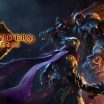
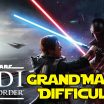
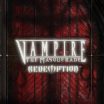

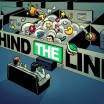
I was also put off by TFA. I’m sure a lot of people liked it at first, but as time went on the feeling of nostalgia gave away to seeing that it was bad. Then again, it WAS directed by JJ Abrams…
But Rogue One? I saw it and loved it. It was a gaiden story that went above and beyond, and even had a sense of scale with stuff like the Death Star and the explosions it made. Darth Vader’s cameos were awesome, and the tragic loss of the heroes was so profound that, after seeing the Empire just on the verge of perfect victory, made their frantic actions all the more satisfying, and even gave meaning to the original IV to VI trilogy as to WHY they were hell bent on droid hunting.
And Gareth Edwards is starting to become my favorite director. He made the 2014 Godzilla movie, and man was that awesome. I might do a review on that myself sometime.